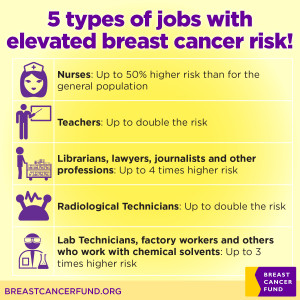A first of its kind review of the scientific literature on women workers and breast cancer has uncovered more than 20 occupations associated with considerably increased risk of breast cancer compared to the risk for the general population.
“Because workers are often exposed to carcinogenic or toxic substances at regular doses for long periods of time, they are the modern day canaries in the coal mine,” said Jeanne Rizzo, president and CEO of San Francisco-based Breast Cancer Fund, which undertook the study. “We are confident that there is a better way forward, and that a cancer-free economy is within our grasp. It’s time to put breast cancer out of work.”
The study report, Working Women and Breast Cancer: The State of the Evidence, is the product of more than two years of work and is a review of most of the scientific studies that have been published in the past 25 years. The study found a link between breast cancer and a number of workplace exposures including solvents, pesticides, ionizing radiation and other toxic materials. There also was an association with night shift work.
The report concluded: “Research is inadequate, but there is enough to raise alarm about women’s work, occupational exposures and breast cancer. At the same time, policies are insufficient to protect worker health.”
Among the 20 plus occupations with considerably increased risk of breast cancer compared to the general population were:
- First responders (police, firefighters, military personnel) – Up to 2.5 times higher risk
- Food and beverage production workers – Up to 5 times higher risk
- Hairdressers and cosmetologists – Up to 5 times higher risk
- Manufacturing and machinery workers – Up to 3 times higher risk
- Doctors, physicians and other medical workers excluding nurses – Up to 3.5 times greater risk
The report recommended that women should be included in occupational studies, noting they have “historically been excluded… which means that health issues that predominantly affect women, including breast cancer, have been at best understudied and at worst ignored.”
Responding to the findings, UK national union federation the TUC called for urgent action to address occupational breast cancer risks in women. TUC head of health and safety, Hugh Robertson, said: “This is a damning report and shows that much more must be done to protect women from exposure to chemicals at work.”
He said in July this year the TUC had asked the Health and Safety Executive (HSE), the UK’s official health and safety regulator, “to produce new guidance on night work to help protect women from breast cancer, but this report shows that more needs to be done across the board to reduce the risk from work.”
Dick Clapp, Professor Emeritus of Environmental Health, Boston University School of Public Health and a member of the President’s panel on occupational and environmental cancer, welcomed the report.
He said: “The authors have produced a comprehensive and thoroughly documented review of the state of the evidence that should be immensely valuable to advocates, students and policy-makers. The Breast Cancer Fund deserves enormous credit for their leadership and vision in illuminating this important part of the breast cancer story.”


